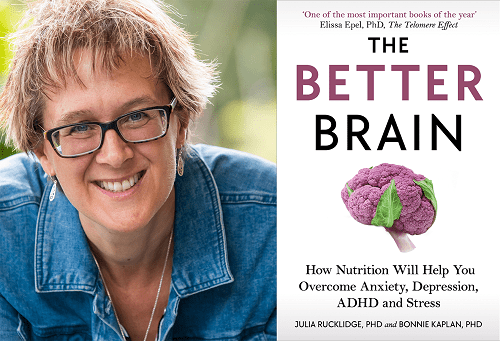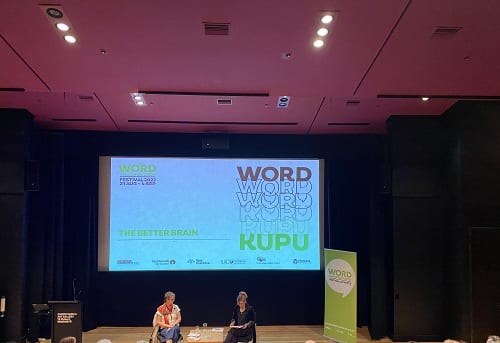Does what we eat affect how we feel? If so, what can individuals and society do?
Julia Rucklidge, a Professor of Psychology and Clinical Psychologist at the University of Canterbury, guided us to explore the issues while discussing her new book The Better Brain at WORD Christchurch Festival.
In the book The Better Brain, Professor Rucklidge elaborates on why good nutrition is crucial for good mental health. The book is based on her decades of research and consists of three parts. The first part explains why our brain needs nutrients and factors leading to decreased nutrient intake, with a reflection on the current treatment paradigm of mental health. The second part includes cases and research outcomes on the role of supplements for different types of mental health issues. The third part is about how to feed our brains with practical guidance and recipes.
Reading this book, readers will find it is thought-provoking, well-researched and instructional. The talk Professor Rucklidge gave at WORD Christchurch Festival brought readers into the research journey and filled in with some interesting details in plain language.
Professor Rucklidge's interest in the role of nutrients in mental health started from the time when she was studying for her Ph.D. in Canada. Her supervisor used nutrients to treat patients with serious psychiatric problems. The nutrients worked well on some patients. This led her to move in this direction to find out more.
One burning question is the role of supplements in mental health treatment. Usually, the importance of food to physical health is understandable. For mental health, Professor Rucklidge explained supplements are micronutrients and a range of minerals the brain needs to function. She used research examples drawn from the 2010 Canterbury earthquakes and Christchurch mosque shootings in 2019 to show that traumatic survivors who received certain nutrients recovered more quickly. She reminded us that mental health is a complex issue caused by various factors although micronutrients would solve part of the problem.
When being asked about some psychologists' statement that supplements are "expensive urine". Professor Rucklidge argued that the statement is biased as some evidence-based results have shown the role of micronutrients in mental health. It is hard to change the existing medical model of explaining mental health since we have been trained to believe in it. However, Professor Rucklidge pointed out,
it is our job to study an idea even if it is controverting the current thinking. This is how we end up with innovative ideas.
Are we eating in a way that leads to anxiety? Professor Rucklidge was concerned with individuals' decreased micronutrient intake due to economic and societal factors. For example, we are not taught about what micronutrients our brain needs. The ultra-processed food has lost the nutrients which are good for the brain. The labels on packed food do not provide consumers with information on micronutrients needed by the brain.
Professor Rucklidge is critical of the existing medical model of mental health and governmental funding. She believes that we are disempowered in terms of accessing nutrients good for our brain. According to her, mental health professionals should have a holistic view of mental health. If medication does not work, we should be open to other solutions. Rather than just increasing funding for training more professionals on mental health, the Government should also consider how to raise awareness of the role of micronutrients in mental health and supply more micronutrients in the food chain.
Professor Rucklidge 's speech brought various factors together and went beyond the level of an individual mental health patient and the discipline of psychology. With the robust research results, she advocates that we need better or innovative thoughts to supply good nutrients for a better brain.
Further Reading
Find books on food and the brain
WORD Christchurch Festival 2022 Coverage
Visit our page of WORD 2022 Festival coverage and info
WORD Christchurch information
- Visit the WORD Christchurch website
- Follow @wordchch on Twitter
- Like @wordchch on Facebook
- Follow @wordchch on Instagram






Add a comment to: Good Nutrients and Better Thoughts: WORD Christchurch Festival 2022